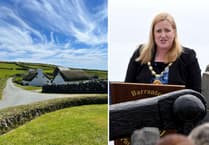The cost of bringing up children in the Isle of Man is putting some couples off having a family.
The situation has been highlighted in a report on population imbalance in the island.
Among its recommendations is the introduction of shared parental leave ‘at the earliest opportunity’.
The Select Committee of Tynwald on Population Rebalancing 2022-23 has released its report that puts forward solutions to rebalance the population. It discusses the Isle of Man’s ageing population, which is causing ‘imbalance’ meaning a large proportion of the island is elderly.
A call for evidence from the general public was issued in the form of a questionnaire to understand the experiences of those giving birth in the island, together with the experiences of those bringing up a child here.
The committee said it was equally interested in hearing from people who had consciously decided not to have children in the Isle of Man.
In total, 280 responses were received.
Throughout the survey there were calls to reform employment legislation, especially maternity and paternity leave.
There was consensus that shared parental leave should be introduced as soon as possible.
The report added: ‘A key concern was paternity at just two weeks in length, which was unanimously considered as wholly insufficient, and particularly so with the care implications of a C-section procedure, for example.’
The questionnaire also sought to find out why those choosing not to have children had made that decision.
Of the 79 responses to this question, the majority cited childcare costs and a lack of affordable housing as reasons not to have a child here.
‘These financial sacrifices and pressures are evidently huge disincentives to having children for many island residents – and particularly additional childcare,’ says the committee.
One respondent said: ‘We can’t afford a house, let alone to raise children, we are considering leaving the island as a result.’
Another said: ‘We made the decision not to have a second child, because of the cost of childcare.
‘We need to buy a house, and childcare is the price of a mortgage.
‘We had to choose between having a sibling for our daughter, or, having an asset for our family.’
Birth rates are falling worldwide, but this decline is ‘particularly evident’ in the Isle of Man, according to the committee’s findings.
Between 2010 and 2020, the number of births here fell by an ‘extraordinary’ 35%, the report states.
There are a number of perspectives on the decline in fertility detailed in the report. The first is that it is being driven by more women in education and work, as well as greater access to contraception, leading to women choosing to have fewer children.
Another is that falling fertility levels are due to a global decline in sperm counts. One study recorded a 50% fall in sperm counts in Western males over a period of just 40 years.
A more recent perspective links the fall in births to environmental concerns.
In a survey of 10,000 people aged 16-25 in 10 countries published in September 2021, 39% described themselves as being ‘hesitant to have children’ due to their concerns over climate change.
The report says: ‘Even though the problem is demographic centred, the solutions may not be so. There is a widely recognised need to reform employment and family support policies.’
The committee puts forward plans on how to ‘rebalance’ the population, meaning it would have equal parts young and elderly.
It was established to clarify demographic challenges in the island, investigate the causes and imbalances, explore where existing policies may inadvertently contribute to the issues, and assess the measures that could be put in by the government to tackle these challenges.
Members are Rushen MHK Michelle Haywood, who is the chair, Paul Craine MLC and Douglas Central MHK Chris Thomas.
It was set up after Mr Craine put forward a motion to see what can be done to address population imbalance.
This report will go before Tynwald in February.



.jpeg?width=209&height=140&crop=209:145,smart&quality=75)

Comments
This article has no comments yet. Be the first to leave a comment.